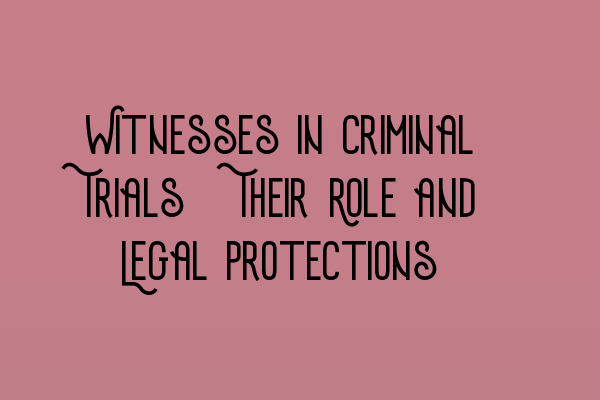Witnesses in Criminal Trials: Their Role and Legal Protections
As a criminal defense solicitor at SQE Criminal Law & Practice Law UK, I understand the crucial role that witnesses play in criminal trials. Witness testimony can be the key to proving a defendant’s innocence or guilt. Therefore, it is essential to have a clear understanding of the role of witnesses and the legal protections they are entitled to under the law.
The Role of Witnesses
Witnesses are individuals who have firsthand knowledge or information about a crime or the events leading up to it. They are called to testify in court to provide evidence regarding the facts of the case. Witnesses can include victims, bystanders, law enforcement officers, and expert witnesses.
When a witness takes the stand, they are required to swear or affirm an oath to tell the truth. Their testimony is then used by both the prosecution and the defense to present their respective cases. Witnesses may be subject to examination-in-chief, cross-examination, and re-examination, depending on the circumstances.
Witnesses have a duty to answer questions truthfully and to the best of their knowledge. However, they can exercise their privilege against self-incrimination if their testimony may expose them to criminal charges. This privilege ensures that witnesses are protected from being compelled to provide evidence that may incriminate themselves.
Legal Protections for Witnesses
Witnesses are granted certain legal protections to ensure their safety, security, and fair treatment throughout the criminal trial process. These protections are in place to encourage witnesses to come forward and provide honest and accurate testimony without fear of retaliation or intimidation.
One of the primary legal protections for witnesses is confidentiality. In many cases, witnesses can request anonymity or have their identities withheld from the public to prevent any potential harm or interference. This is particularly important in cases involving organized crime, gangs, or other dangerous situations.
Witnesses may also be eligible for special measures to assist them in giving their evidence. These measures can include testifying behind a screen, providing evidence via video link, or having a supporter present during their testimony. These measures aim to reduce the stress and anxiety witnesses may experience while testifying in a courtroom setting.
It is important to note that witness intimidation is a serious criminal offense. The law provides safeguards to protect witnesses from being threatened, harassed, or intimidated in any way. Anyone found guilty of witness intimidation can face substantial penalties, including imprisonment.
As criminal defense solicitors, we at SQE Criminal Law & Practice Law UK understand the critical role witnesses play in the justice system. We are committed to upholding the rights of witnesses and ensuring that they are treated with respect and fairness throughout the criminal trial process.
Conclusion
In conclusion, witnesses play a vital role in criminal trials and provide crucial evidence to help determine the outcome of a case. The legal system provides various protections to ensure witnesses’ safety, confidentiality, and fair treatment. At SQE Criminal Law & Practice Law UK, we are dedicated to protecting the rights of witnesses and delivering effective legal representation. If you need assistance or have any questions regarding witnesses or criminal law matters, please don’t hesitate to contact us.
For more information on SQE exam preparation, you may find the following articles helpful:
- SQE 1 Practice Exam Questions
- SQE 1 Practice Mocks FLK1 FLK2
- SQE 2 Preparation Courses
- SQE 1 Preparation Courses
- SRA SQE Exam Dates
